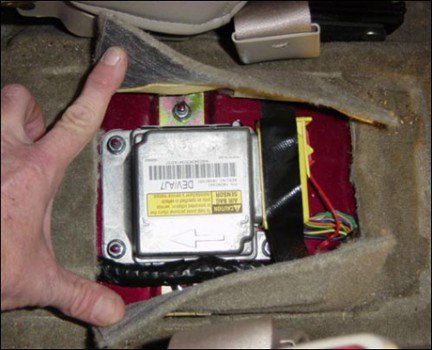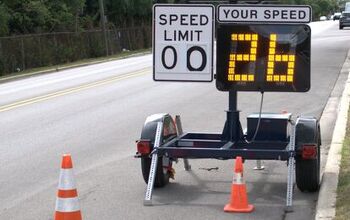Will the New Transportation Bill Mandate Black Boxes in All New Cars?

The new highway bill recently passed by the U.S. Senate, the Moving Ahead for Progress in the 21st Century Act or MAP21, has come under some criticism, in part because of a provision that would give the IRS power to strip American citizens of their U.S. passports if they own the federal government enough money.
(a) Mandatory Event Data Recorders-
(1) IN GENERAL- Not later than 180 days after the date of enactment of this Act, the Secretary shall revise part 563 of title 49, Code of Federal Regulations, to require, beginning with model year 2015, that new passenger motor vehicles sold in the United States be equipped with an event data recorder that meets the requirements under that part.
The cited part of CFR 49, establishes standards for EDRs if manufacturers voluntarily install them. S.1813 would make such installation, as the legislation says, mandatory, with civil penalties imposed on manufacturers for non-compliance. Theoretically the the car owner or lessee would still own the data, but the bill carves out exceptions that could give the government broad access to your personal travel data.
(2) PRIVACY- Data recorded or transmitted by such a data recorder may not be retrieved by a person other than the owner or lessee of the motor vehicle in which the recorder is installed unless–
(A) a court authorizes retrieval of the information in furtherance of a legal proceeding;
(B) the owner or lessee consents to the retrieval of the information for any purpose, including the purpose of diagnosing, servicing, or repairing the motor vehicle;
(C) the information is retrieved pursuant to an investigation or inspection authorized under section 1131(a) or 30166 of title 49, United States Code, and the personally identifiable information of the owner, lessee, or driver of the vehicle and the vehicle identification number is not disclosed in connection with the retrieved information; or
(D) the information is retrieved for the purpose of determining the need for, or facilitating, emergency medical response in response to a motor vehicle crash.
While most Americans would not have much objection to Parts A and B, court ordered or consensual searches, Parts C and D create issues over civil liberties. They also might give the federal government powers that constitutionally rest with the individual states. Traffic laws are enforced at the state and local levels in the United States. Sections 1131 and 30166 of CFR 49 are what gives the National Transportation Safety Board it’s authority to investigate transportation accidents. That authority is fairly broad and technically covers all motor vehicle accidents so the new legislation would appear allow the NTSB to have access to EDR data even in the event of a minor fender bender.
Currently federal and state highway taxes are paid through levies on fuel and some have suggested that the mandated EDRs are a preliminary step to GPS based mileage taxes. Highway taxes, state and federal, are collected through levies on gasoline and diesel fuel (“This truck pays $X,XXX a year in road taxes”). EVs and cars powered by natural gas end up paying no road taxes. Part D references information retrieval to facilitate emergency responses to accidents. That could only work if the data recorder also logged GPS data, so responders would know where to find accident scenes, but which could also be used to determine how many miles you traveled in which jurisdictions for taxing purposes. That comes close to perpetual surveillance.
Part D is potentially very troubling. I can’t see how EDR data can help emergency responders once on the scene, the legislation only makes sense if they have access to the data before getting on scene. It’s access to airbag deployment and GPS data that would facilitate emergency response, getting them to the scene of an accident quickly, not access to that and other data once on scene. None of the information stored in the EDR would be relevant to responders on scene. Part D seems to be purposed to give government agencies real-time access to systems like OnStar, so that emergency responders would be notified of airbag deployments and the like, along with GPS data to locate the site of the accident. Do you really want your government to have real time access to your GPS data?
Ronnie Schreiber edits Cars In Depth, a realistic perspective on cars & car culture and the original 3D car site. If you found this post worthwhile, you can dig deeper at Cars In Depth. If the 3D thing freaks you out, don’t worry, all the photo and video players in use at the site have mono options. Thanks for reading – RJS

Ronnie Schreiber edits Cars In Depth, the original 3D car site.
More by Ronnie Schreiber
Latest Car Reviews
Read moreLatest Product Reviews
Read moreRecent Comments
- Redapple2 jeffbut they dont want to ... their pick up is 4th behind ford/ram, Toyota. GM has the Best engineers in the world. More truck profit than the other 3. Silverado + Sierra+ Tahoe + Yukon sales = 2x ford total @ $15,000 profit per. Tons o $ to invest in the BEST truck. No. They make crap. Garbage. Evil gm Vampire
- Rishabh Ive actually seen the one unit you mentioned, driving around in gurugram once. And thats why i got curious to know more about how many they sold. Seems like i saw the only one!
- Amy I owned this exact car from 16 until 19 (1990 to 1993) I miss this car immensely and am on the search to own it again, although it looks like my search may be in vane. It was affectionatly dubbed, " The Dragon Wagon," and hauled many a teenager around the city of Charlotte, NC. For me, it was dependable and trustworthy. I was able to do much of the maintenance myself until I was struck by lightning and a month later the battery exploded. My parents did have the entire electrical system redone and he was back to new. I hope to find one in the near future and make it my every day driver. I'm a dreamer.
- Jeff Overall I prefer the 59 GM cars to the 58s because of less chrome but I have a new appreciation of the 58 Cadillac Eldorados after reading this series. I use to not like the 58 Eldorados but I now don't mind them. Overall I prefer the 55-57s GMs over most of the 58-60s GMs. For the most part I like the 61 GMs. Chryslers I like the 57 and 58s. Fords I liked the 55 thru 57s but the 58s and 59s not as much with the exception of Mercury which I for the most part like all those. As the 60s progressed the tail fins started to go away and the amount of chrome was reduced. More understated.
- Theflyersfan Nissan could have the best auto lineup of any carmaker (they don't), but until they improve one major issue, the best cars out there won't matter. That is the dealership experience. Year after year in multiple customer service surveys from groups like JD Power and CR, Nissan frequency scrapes the bottom. Personally, I really like the never seen new Z, but after having several truly awful Nissan dealer experiences, my shadow will never darken a Nissan showroom. I'm painting with broad strokes here, but maybe it is so ingrained in their culture to try to take advantage of people who might not be savvy enough in the buying experience that they by default treat everyone like idiots and saps. All of this has to be frustrating to Nissan HQ as they are improving their lineup but their dealers drag them down.


































Comments
Join the conversation
They're already in cars. The only difference here is there will be a standard that will allow owners to actually see what's being tracked - unlike each maker's proprietary codes now - and it's determined the car's owner is the owner of the data. It's already there, and been there for at least ten years. Everything else is just knee-jerk whining about big government demonstrating a lack of understanding about civics that an eighth grader could explain. As has been pointed out earlier, you have a lot more to fear from third parties that can read your cell phone or know you look at this website.
I'm amazed by the amount of people that actually don't mind this Orwellian turn of events being propagated by members of both "parties." Just wait until your next divorce or child custody hearing and your travel and driving style get subpoena'd into the record to show you're an unfit parent. Your whereabouts are now available to the Fed (and any other law enforcement agency that wants them) on demand. Next time you do a slow roll through a stop sign or hit 41 in a 35 your ticket will be in the mail.